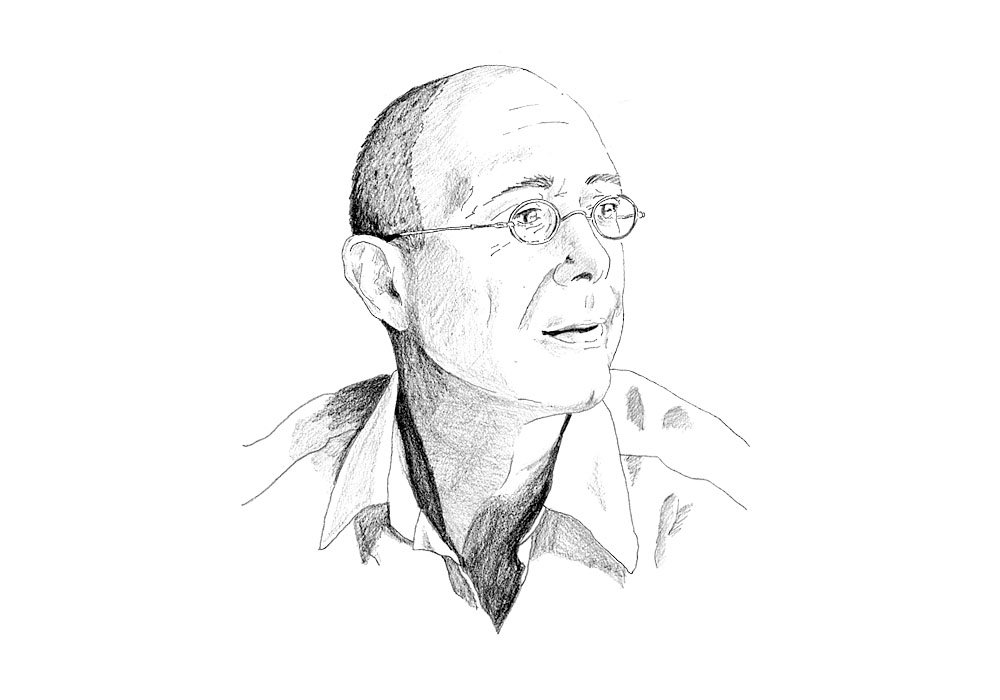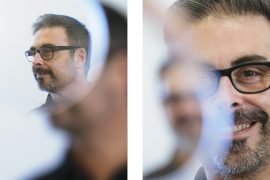The cultural philosophy of Rob Riemen (The Netherlands, 1962) scrutinizes the “soft” enunciations of the present day, looking for a better foundation of European civilization. It’s a certain idea of Europe. In 2008, he published his first book Nobility of Spirit, recently translated into Spanish. There, Riemen stressed the urgent need to recover the humanistic values of high culture to fight against the new fascist temptations, in all their variants, that grow dangerously throughout the West. For Riemen, graduate in theology from the University of Tilburg, the rise of the politics of resentment is a symptom of a deeper moral crisis. Since then, Riemen has published up to five books on this fundamental issue. The most recent, To Fight against this Age (2018), where he reflects on how to reverse the current propensity to democratic and cultural deterioration, inspired by Ortega, Mann or Spinoza. Riemen is founder and president of the Nexus Institute, center of thought and meeting point for the debate that tries to answer the ambitious question of how to learn to live better.
What means the idea of ’Nobility of spirit’?
It is a central idea within European humanism, that reflects the essence of human dignity. It is a very democratic idea, since you do not need a social status or large sums of money, not even higher education, to develop it. Nobility of spirit is what makes us human, what allows us to live with meaning. We can also define it taking Socrates’ question, that any civilized society needs to be able to answer: what means living a good life? And, what defines a good society? These are two issues that are linked, somehow you cannot answer one without the other, and in both the answer considers the idea of nobility of spirit. It is, in short, what an advanced society should invest in. That is why it is so important to reflect on what defines a life as “well lived”, and what makes a society focused on the ideas of justice and truth. From here arise values, a way of understanding life, a scheme of political thought, an idea of how we educate our young people or an idea of Europe.
At the same time, in your books you warn about that populist trap, that says that we all have the right to everything. How do these two forces meet eachother?
Taking historical perspective allows us to see the complexity of this relationship. Think of the thirties. Then, very few could have foreseen the rise of fascism in an educated society like the Dutch, or the German, and the same can be said of countries that are generally well-educated and have a long Catholic tradition, such as Italy or Spain. It is an idea that lucidly describes Thomas Mann in Doctor Faustus. We know for certain that the world of high culture and science, including monarchs and royals, have been accomplices in the past with fascism and Nazism. That’s why I like talking about spirituality more than high culture, since the latter has shown in the past that it is no guarantee. Nobility of spirit is not so much the result of cultivating the mind, being able to solve complex problems or having a scholarly knowledge, it is about knowing how to cultivate the soul. That is the path to wisdom. Everyone can cultivate the soul, and everyone should do it. That is why we say that it is something truly democratic, since it is an intimate and personal enterprise, not subject to any restrictions. Part of Jesus’ message is to abandon material wealth, adopt a low profile and focus on spiritual growth. Socrates makes a similar argument. Spinoza also points out the importance of that idea of nobility of spirit. Cultivating the soul is closely linked to the idea of liberalism in the sense that it is, in short, to be free of our own stupidity, not to be slaves to our own prejudices, emotions, feelings, superficial desires or authoritarian instincts.
Nobility of spirit is not so much the result of cultivating the mind, being able to solve complex problems or having a scholarly knowledge, it is about of knowing how to cultivate the soul. That is the path to wisdom. Everyone can cultivate the soul, and everyone should do it.
If cultivating the human soul is the pursuit of wisdom, where do we start from?
In this search, the world of high culture is an immense treasure; that is, the world of the classics. Today we can still read Plato’s Dialogues -which date from more than 2,000 years ago- as if they had been written yesterday. We can be moved by Bach’s music just as generations much before us did. What contains true wisdom is what lasts, that’s why the classics, now so forgotten, are essential for the cultivation of the soul. Today, instead, we are going the wrong way: neither the data, nor the ubiquitous algorithms, nor Google, nor the universities of the Ivy League, nor even the academic world will help you. In short, being smart is not the same as being wise. The language of music is probably the only tool to know and explore our emotions and feelings, also to transmit them better. Reading is the best way to develop the imagination. Without imagination, and without a good sentimental education, it is impossible to be compassionate, sympathetic, since one cannot get an idea of the feelings and emotions of others.
In your books, the political crisis, especially intense in Europe, is seen as a symptom of a deeper moral crisis. Whose fault is it?
The first that needs to be recognized is that we are facing a crisis of our civilization in general, which is partly the result of a dysfunctional political elite, too often incompetent, whose great criterion of action is usually that of its own survival. It is a widespread phenomenon except for China, probably, which -as we know- has other problems. This story is not new. A similar dynamic is detected in corporate leadership. Let us think that the financial crisis -a crisis that had a very high economic and social cost, especially intense in southern Europe- was caused by a relatively small number of people educated in top-level universities. A financial elite that -generally speaking- has been unable to assume its responsibilities. This has precedents. Then there is the chronic stupidity of the mass media, which is a dynamic that we have seen before in the past.
In To Fight against this Age, you speak of Ortega’s “mass-man”. Part of this disorder is also our fault?
To understand the behavior of the political and financial elites we have to understand their origin. The elites are a reflection of society itself. That’s why they have no interest in changing anything either. Their incentives are basically to perpetuate the status quo that has empowered them. I highlight two major elements that explain the current situation: the betrayal of intellectuals and, consequently, the profound crisis in the field of education. We can only change society by counting on better ideas and a better education. Let’s go to Ortega y Gasset. The “mass-man” describes the gregarious mentality of those who have lost interest in the questions that Socrates formulated and which, for me, constitute the roots of the problem of this kitsch society, a society that forgets the moral dimension and the spiritual values, this society where my identity is not determined by who I am, but by what I have, a society that is irremediably a slave of resentment. A society tied to objectives without real sense, slave of a spurious consumerism, increasingly dependent on more stupid things. That has a special impact on the academic, financial and journalistic world.
Thomas Mann warned premonitorily at a conference in Los Angeles that if fascism ever returned, it would do so under the convenient disguise of freedom. How do we then identify fascism?
Fascism has no ideology. The key is to understand its origins. It is a rather prosaic idea, devoid of the utopian dimension of communism, and that basically is about the acquisition of power. It does not have an elaborate ideology. That is why the fascist needs to hide this emptiness with external enemies, scapegoats, and a rhetoric that seeks to fuel hatred, resentment and confrontation. It is organized as a secular religion, hence the kind of messianic leadership that is called for by the mass. Fascism advances in societies that are morally disarticulated and that can be easily manipulated by propaganda.
What does that abandonment from the intellectuals mean?
Their responsibility is crucial. We tend to limit everything to closed definitions and superficial political theory, which has pushed this Cartesian intellectual profile to look for something that was not there, and this has limited the solvency of the diagnosis. Thus, arises the abuse of the term “populist”, today empty of real meaning. We are facing a new fascist threat. Populism is a tradition also with history, but it is another thing: it is irritating, crude, annoying, but much more innocuous.
At the very moment we abandon the idea of the European Union and return to the previous stage from which we came, the most probable scenario is that of a Third World War. We, Europeans, must be aware of our history and the courage it demands from us the European project.
This undemocratic rhetoric is not only taking place on the right flank of the ideological spectrum in Spain, but also in Italy there are phenomena that fit with the archetype described here, from Trump to Podemos in Spain.
Unfortunately, I do not read Spanish, which makes my knowledge of the situation in Spain very limited. But it does seem important to note that precisely because fascism is an empty current, we must identify it according to some of its symptoms. There is the figure of a charismatic leader, usually a man, but it can also be a woman, as in the case of Marine Le Pen. The populist leader must know how to communicate in a way that satisfies the masses. Then there is the central element of the external enemy, or scapegoat, omnipresent, that articulates the propaganda discourse. By not having real proposals, all statements go against something or someone. Another clear element is the victimhood of which they then want to be saviors. Everything varnished, normally, by a materialist and nationalist dialectic, traditional excuses that have served to lift the masses. When one has these elements in a dormant society, that is, a mass democracy and not a real democracy, democratic values deteriorate, and a fascist dynamic is imposed. I have no problem calling fascists parties like the Northern League or the 5 Star Movement, political forces that work de facto to weaken democratic values and make anti-politics.
Has Europe returned to the 1920s?
Political dynamics are dangerously similar to the ones when fascism began. Hitler and Mussolini were not the only fascists in Europe, then. There were millions of them. What made possible that there were millions of people favorable to fascism even though many were educated people? The key element was a policy that worked in favor of confrontation, not in defense of harmony. A policy that fueled nationalism, the poison of Europe. Nothing good will ever come out of nationalism.
It seems that these are problems of cyclical recurrence.
The great challenge of Europe is to overcome the aggregation of nation-states. There is a certain immaturity in the political class and the way in which we face problems. An immaturity similar to that once denounced by characters such as Albert Camus or Mann himself, when they warned that the war was over but not the “mass-man” grudge policy, which kept the threat of fascism alive. This democratic devaluation, if we look at the global scenario, is a widespread phenomenon: we see it in Europe, we see it clearly in Russia and Turkey, we see it in the United States, and the list could follow.
Are our leaders aware of the threats to which we are confronted?
Precisely, in my story “The Princess of Europe” -included in To Fight against this Age– I am very critical with what I consider a lack of real leadership by European elites. That is a Europeanist text that makes the reminder, fundamental for me, that at the very moment we abandon the idea of the European Union and return to the previous stage we came from, the most probable scenario is that of a Third World War. Europeans must be aware of our history and the courage that the European project requires of us all. It was not so long ago that we experienced the Balkan War.  Do you think that Third World War is possible?
Do you think that Third World War is possible?
War, whether we like it or not, is part of our nature. The idea of civilization, of a liberal democratic order, is the exception to the norm. A society in peace has been an exception to the norm, just look at European history. That is why the political discourse in favor of rancor and fear is so worrying. It feeds of our most primal instincts, and therefore it is not so difficult to provoke a scenario in which there is no point of return. We are stepping in a very dangerous terrain, once the fire starts it is impossible to stop the destructive dynamic. The First World War started out of nowhere. One day two potencies declared war for a nationalist stupidity, and a few months later the whole world was in flames. It is a real risk.
How can we reduce those risks?
First, it is important to recognize that it is a task that concerns us all. It does not help to delegate everything to the elites even if they are a fundamental part of the crisis itself. We have to leave our comfort zone, especially young people and students, and accept our responsibility within society. It is never an easy task to say things as they are, many times there are social pressures, but that is the right thing to do. We are living in a time when too many alarms signs have already showed, to assume as normal that the majority of people are to be carried away by the mainstream. Europe still has an opportunity. Europe, unlike Russia or Turkey, is not a police state, we have separation of powers and free societies with a legal system of efficient protection. We can still reverse this situation of degeneration without reaching a potentially violent scenario.
How?
Important changes need to be made. An essential change is the education system. We must recover high culture in education. In my next book I am addressing the issue of technological change and its limits. In the second essay I am addressing the criticism of everything related to transhumanism. I do not question the fact that perhaps one day there will be the technical ability to download the thoughts of a person in a computer, as defended by techno-evangelist Ray Kurzeil. But the bottom line is that, at that time, we will stop being human and we will be something else. We will no longer speak of human societies: there will be no values, there will be no morals, no ethics, no human dignity.
Harari, another techno-evangelist, goes further by stating that we will not only be robots, but that we will be gods.
I participated not long ago in a debate at the BBC with Steven Pinker, partly one of the new ideologists of Silicon Valley, where a new Holy Trinity is being imposed: science, technology and money. With these three magic wands we can face all the problems of the world. This is how new gods appear, like Bill Gates. I have come to the conclusion that this way of thinking, devoid of a solid base from the point of view of morality and humanism, is also very dangerous. The great ability of Harari is to digestibly pack all this new belief and help its popularization. To a certain extent, fascism has become the new religion of the “losers”, and technology and science, the new religion of the “winners”. We are forgetting about the middle layer, the need to revitalize that European humanism and, for that, we must strive to reinforce the cultural structure that allows us to recover values. Bill Gates has done a magnificent job fighting against malaria and other endemic diseases such as climate change, but we must not forget the cultivation of the soul. As a matter of fact, we cannot fight effectively against the erosion of the environment if we are not able to recover the idea of nobility of spirit before.




















